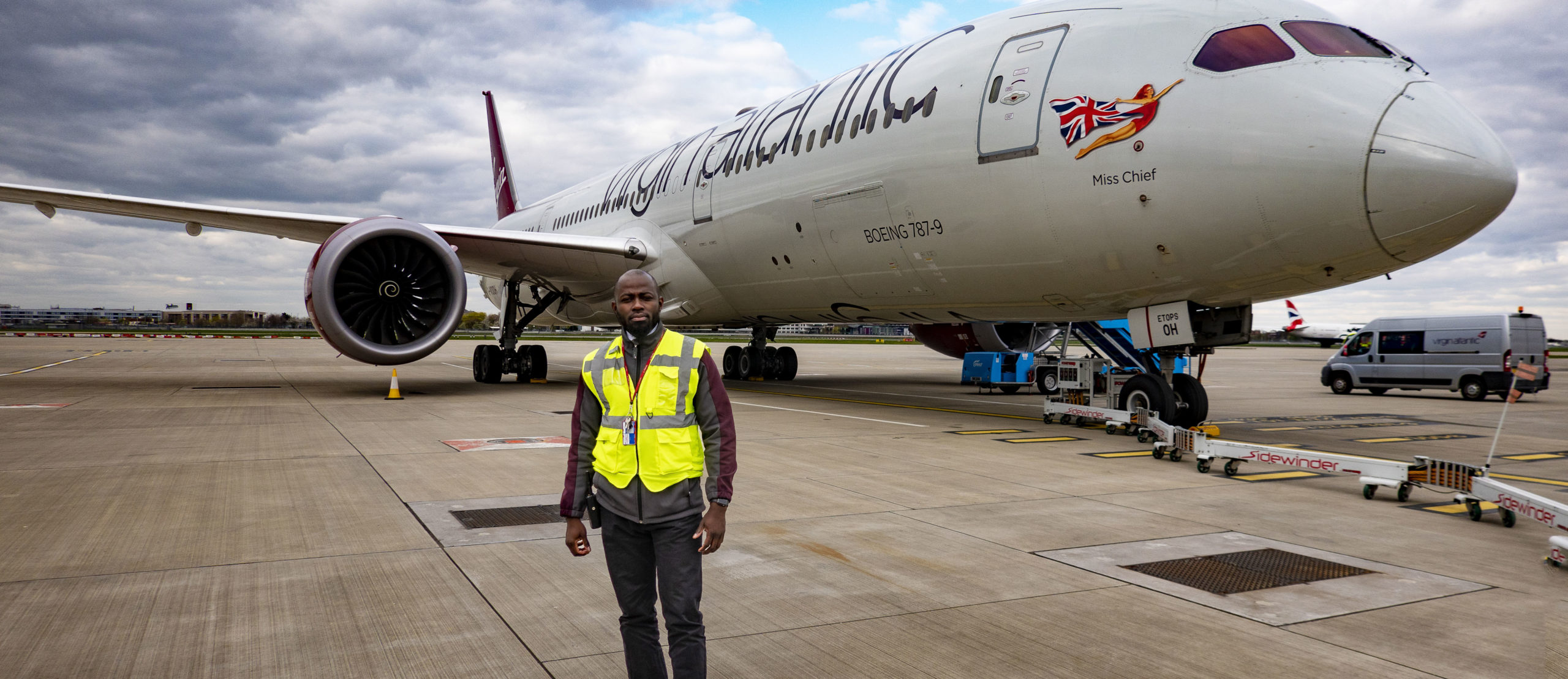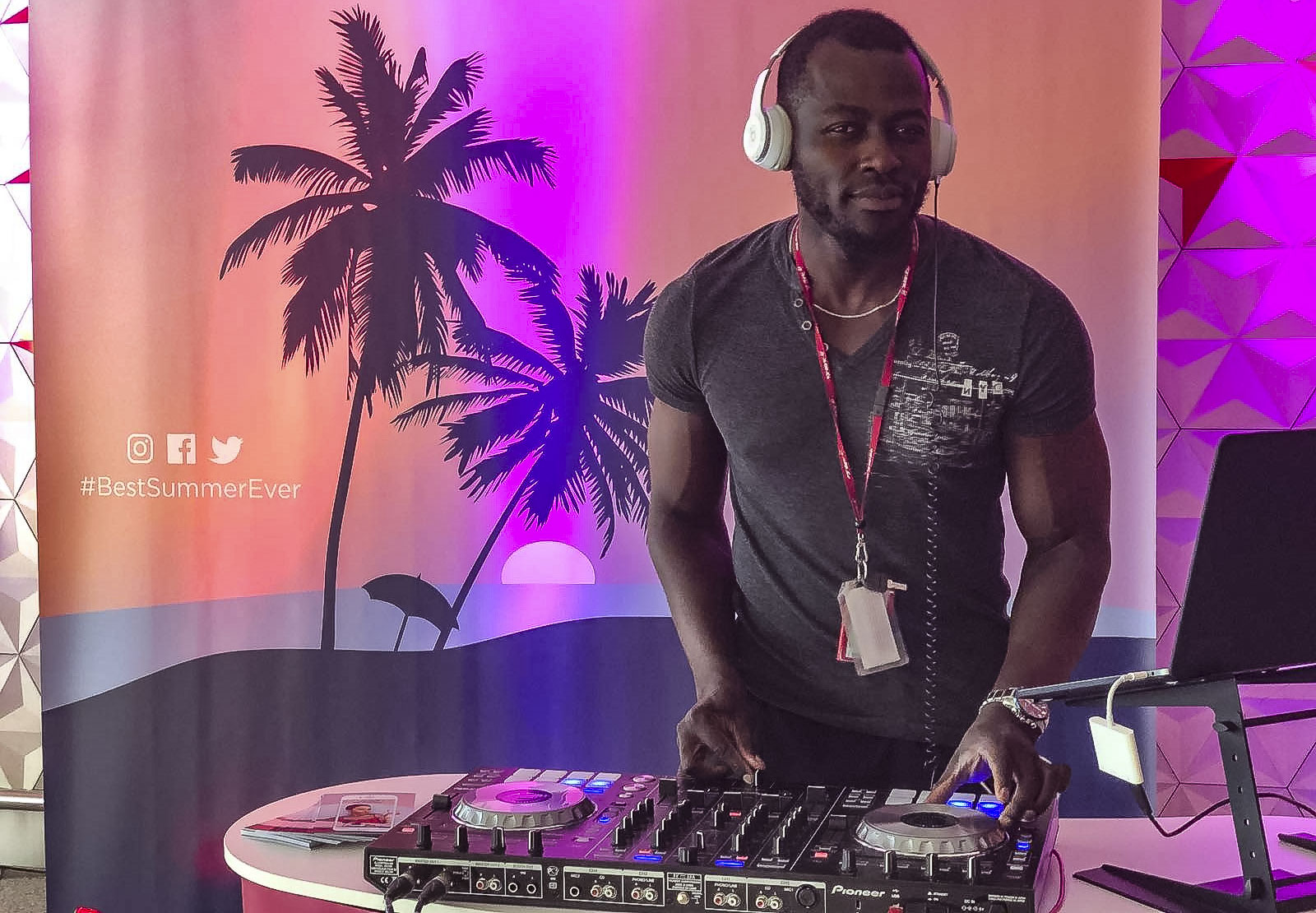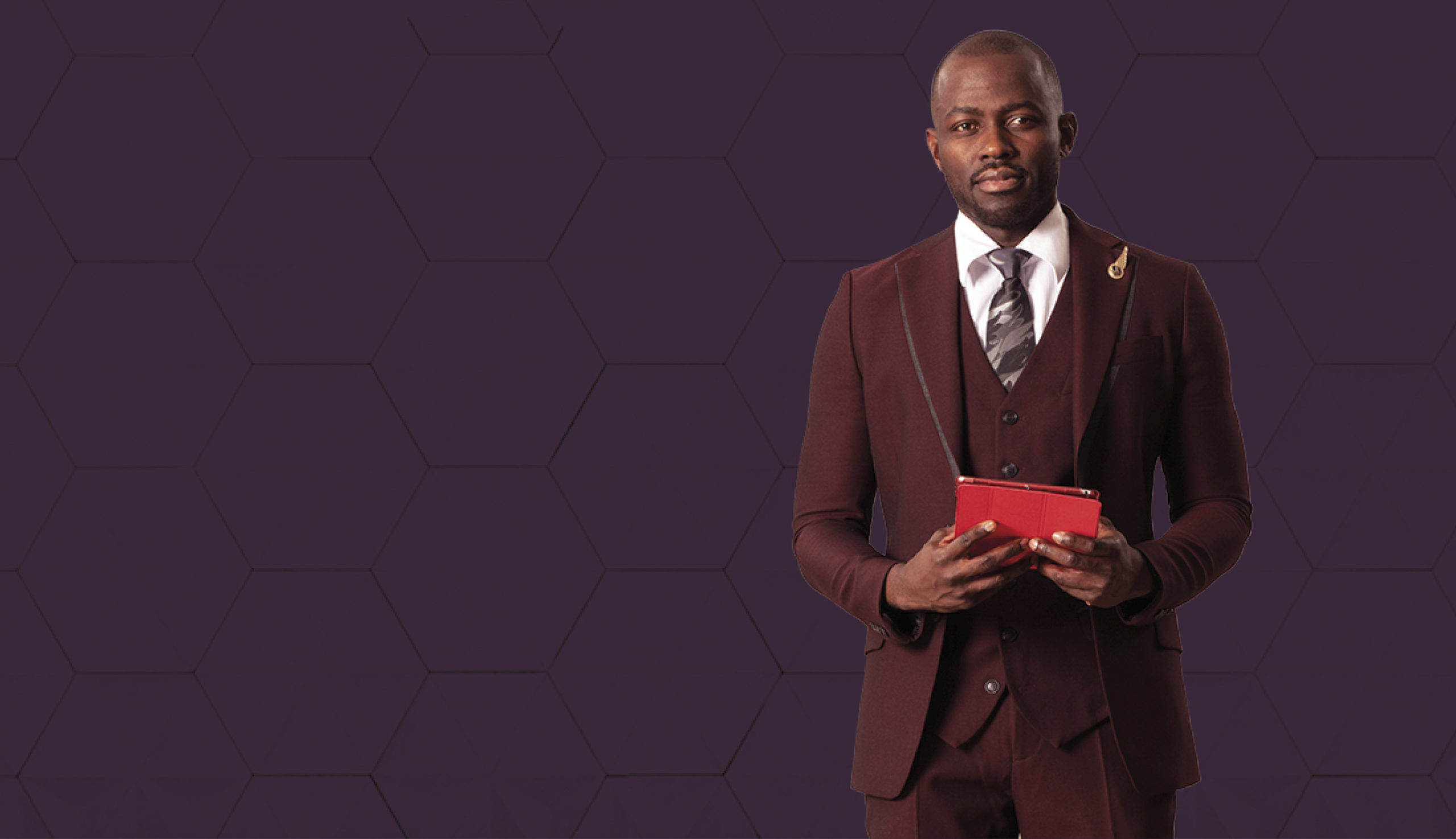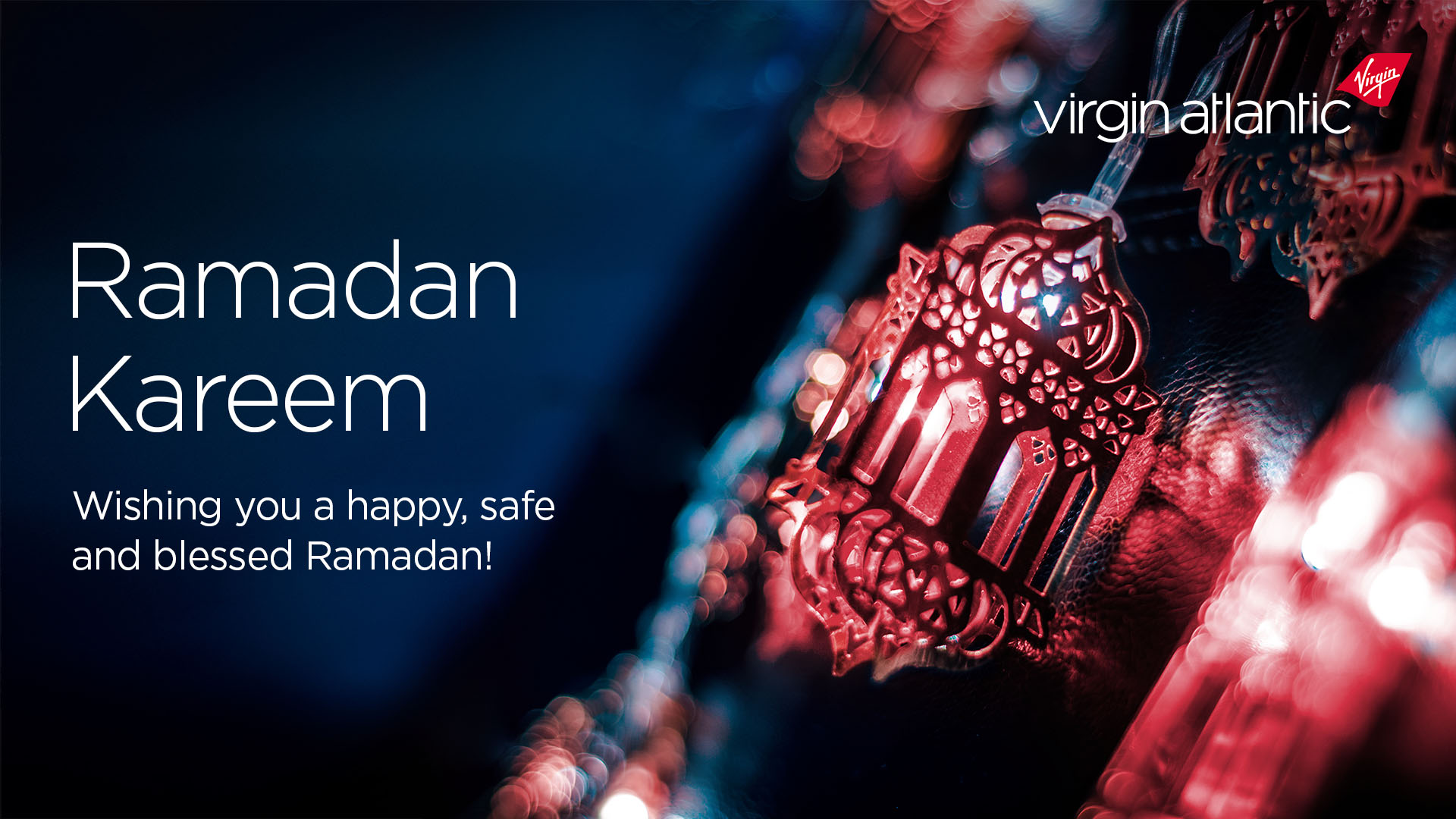Ramadan on the ramp with Sulaimon Awodeji

Following the sighting of the crescent moon in Saudi Arabia on Sunday evening, prayers will be said tonight to mark the beginning of the holy month of Ramadan. For Sulaimon Awodeji, one of our turnaround officers at Heathrow, it marks the beginning of his favourite time of year.
Sulaimon Awodeji is something of a legend at Virgin Atlantic, well known for always going above and beyond, an attribute repeatedly recognised by both customers and colleagues. He’s also known for his DJ skills, having played at our legendary staff Christmas parties.
We caught up with Sulaimon to talk about his role, about Ramadan, and how everything he does is guided by his faith.
Sulaimon originally came to the UK from Lagos to study politics at Kingston University. After graduation, his love of travel drew him to the world of aviation. His career with Virgin Atlantic began with a job as a porter in our Heathrow Clubhouse. He then spent two years as a customer service agent, working on the check-in desks and boarding gates. Then, six years ago, he successfully applied for his dream job as one of our turnaround officers.
The job
Turnaround officer is one of the coolest jobs in the airline world but one that comes with huge responsibilities. It involves keeping a close eye on everything happening around an aircraft on the ground including the safety and security of our customers, crews, and everyone working on the stand. It begins before the aircraft arrival with a check to make sure the stand is free of litter and that all support vehicles are correctly positioned. Then the airbridge needs to be attached. Over the next couple of hours, scores of people perform dozens of different jobs. Safety and security are the absolute priority but are closely followed by the need to make sure the aircraft departs on time. Everything from the weather to late bags needs to be carefully monitored and managed. Every item loaded onto the aircraft is checked and logged, and chased if they’re running late. Everything is then cross-checked with the pilot’s calculations to ensure the aircraft’s weight and balance are correct. A thousand things need to go right to achieve a safe and secure on-time departure. And things can go from ‘ticking along nicely’ to ‘pretty intense’ in a heartbeat. No two days are ever the same and it takes a level head to keep track of it all.
For all the camaraderie of the job and the pride that comes with every on time departure, it’s not the day-to-day challenges that Sulaimon enjoys the most. “It’s being able to make a difference,” he says. “if you see an elderly person struggling, I believe you should take it upon yourself to take charge. That’s not something I do for praise. It’s what I’d want to see happen to my mum and dad. It’s all about putting yourself in our customer’s shoes. About being empathetic”. And much of this admirable view of life comes from his faith. Sulaimon is a devout Muslim, and today is the start of the holy month of Ramadan, a time when those views and beliefs are reinforced.

During our ‘Best summer ever’ in 2019, Sulaimon entertained our customers at check-in with his DJ skills
What is Ramadan
Religious festivals are among the most joyous events on the planet, and they don’t come much more significant or more devout than Ramadan. Also known as Sawm, Ramadan is the fourth of the five pillars of Islam – the core values every Muslim must abide by. Observed by most of the world’s 1.6 billion Muslims, Ramadan is a month of fasting from dawn to dusk. It celebrates the time of the year when it is believed the Angel Gabriel first revealed the Qur’an and the words of Allah to the Prophet Muhammad. During this month, all Muslims fast from just before sunrise until sunset. That includes anything that goes into the body, including water. They must also refrain from bad behaviour, including gossiping, swearing, lying, and arguing, to name a few. The elderly, young children, those who are frail or in poor health and people who are travelling, pregnant, or breastfeeding are exempt from fasting. The holy month of Ramadan ends with Eid al-Fitr, a huge celebration (Eid means festival, al-Fitr is breaking of the fast). This begins with dawn prayers, known as Fajr, donning your finest clothes and heading to the local Mosque to join friends, family and the local community, using the traditional Eid greeting “Eid Mubarak”, which means blessed festival. It’s also a time to share food, exchange gifts and make Fitrana, a charitable donation.
Geography and Ramadan
Ramadan takes place in the ninth month of the Islamic calendar and begins with the sighting of the new crescent moon. The Islamic calendar is based on the lunar year of 354 days so is shorter than the 365-day solar calendar. This means that Ramadan falls approximately 10 to 12 days earlier each year and it will be 33 years before Ramadan returns to the month of May. This impacts how long Muslims need to fast each day, depending on where in the world they live.. For those living close to the equator, where days and nights are pretty even year-round, fasting times remain constant from year to year. But for those living in northern or southern extremes, the timings can mean longer or shorter fasts. This year, the longest fast time is around 20 hours in Greenland and the shortest 11 hours and 20 minutes in New Zealand. The most extreme examples of this happen when Ramadan occurs at the time of the summer solstice. Instead of using the sunrise and sunset to determine when to fast Muslims living in polar regions are given special dispensation to follow Mecca’s fasting times. Sulaimon discovered this the hard way. Having lived all his life in Lagos, near the equator, he was used to the fasting time being around 13 hours regardless of the time of year. His first UK Ramadan was in July which, being in the northern summer, meant a fast of 18 hours. He wasn’t expecting that. But he reaped the benefit a few years later when Ramadan had moved to November and the period of fasting was much shorter. However, food and fasting isn’t the main focus of Ramadan. First and foremost, Ramadan is a time for spiritual reflection and growth, prayers and spending time with family and friends.
Gratitude, humility and selflessness.
Ask any Muslim and they’ll tell you that the real purpose of Ramadan is to take time to enhance spiritual discipline, contemplate your relationship with God and purify the mind, body, and spirit, leading to greater clarity, sensitivity and health. All Muslims also make special efforts during Ramadan to connect with their communities and reach out to people who need help
“With the demands of modern life, it’s all too easy to become lost and forget who we are, and to lose focus on our divine purpose and destiny”, said Sulaimon. “Fasting in Ramadan for thirty days is a powerful way to restore and strengthen focus, direction, balance and purpose to your life”.

Sulaimon was the star of our website back in 2020.
How can I help?
Sulaimon and the Muslim community at Virgin Atlantic know they work somewhere that welcomes and celebrates all cultural and religious identities. But how does it work in practice? Especially when your day is spent in a dynamic, fast-paced environment? It all comes down to being mentally and spiritually prepared.
Being around people eating and drinking or strolling to work through a terminal building packed with restaurants is something that Sulaimon takes in his stride. And although he never advertises that he’s fasting, he finds his colleagues are cognisant and understanding. “Ramadan challenges you to concentrate on your actions. To be kind to the people around you,” said Sulaimon
After experiencing a very different Ramadan in 2020, Sulaimon is looking forward to the Mosques being open, the resumption of communal prayers and being able to celebrate Eid-al-Fitr properly with family, friends and colleagues of all faiths. Our whole team at Heathrow will be celebrating with him.


